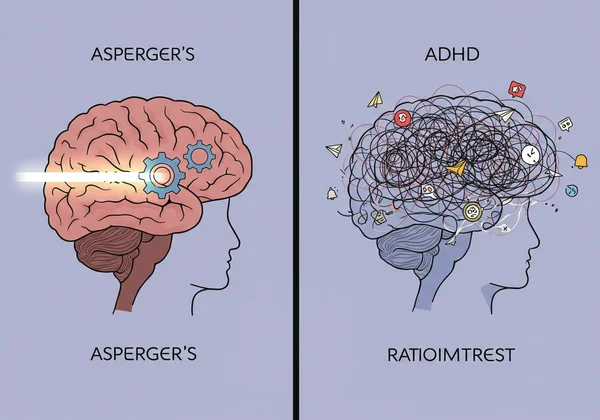Asperger's Test: Differentiating Asperger's from ADHD & Social Anxiety
August 17, 2025 | By Jasper Finch
Do you find social situations challenging, struggle with focus, or feel overwhelmed by sensory input? It can be confusing when your experiences don't seem to fit neatly into one box. Many traits of Asperger's Syndrome (now officially part of Autism Spectrum Disorder or ASD), Attention-Deficit/Hyperactivity Disorder (ADHD), and Social Anxiety overlap, leaving many people asking, what are the symptoms of undiagnosed Asperger's in adults? This guide provides a clear, empathetic comparison to help you understand the key differences. Gaining this clarity is the first step toward self-understanding, and a high-quality aspergers test can illuminate the path.
Navigating the world of neurodiversity can feel like trying to solve a complex puzzle. You might recognize certain pieces in yourself—like intense focus on a hobby, difficulty with small talk, or a sense of anxiety in crowds—but struggle to see how they all fit together. This is a common experience, and you are not alone in this journey of discovery. By exploring the core distinctions between these neurotypes, you can begin to build a clearer picture of your own unique wiring. If you suspect Asperger's traits resonate most, an online aspergers test can be a valuable starting point.

What Looks Like Asperger's But Could Be ADHD?
One of the most frequent points of confusion is the overlap between Asperger's and ADHD. Both can affect executive functions, which are the mental skills we use to manage time, pay attention, and organize tasks. However, the underlying reasons for these challenges are often quite different. Understanding these differences is crucial for anyone considering an adult aspergers test.
Focus & Attention: Special Interests vs. Distraction
A key difference lies in the nature of focus. In Asperger's, there is often an ability for intense, prolonged concentration on a "special interest." This isn't just a hobby; it's a deep, passionate, and highly focused area of expertise. An individual with Asperger's might spend hours happily absorbed in learning everything about a specific topic, showing remarkable long-term attention.
Conversely, ADHD is primarily characterized by distractibility and difficulty regulating attention. A person with ADHD might also jump between many interests, but they often struggle to sustain focus, even on tasks they enjoy, because their attention is easily pulled away by external stimuli or internal thoughts. The core challenge is one of attention dysregulation, not necessarily a lack of interest.
Social Challenges: Misreading Cues vs. Inattention
Both individuals with Asperger's and those with ADHD can find social situations difficult, but for different reasons. For someone with Asperger's, the challenge often stems from difficulty intuitively understanding and interpreting non-verbal social cues like body language, tone of voice, or sarcasm. They may not naturally "read the room," leading to misunderstandings, though they may have a deep desire for connection.
For a person with ADHD, social difficulties are often a byproduct of inattention, impulsivity, or hyperactivity. They might miss parts of a conversation because their mind has wandered, or they may interrupt others or speak out of turn due to impulsivity. The issue isn't necessarily a deficit in understanding social rules, but rather difficulty applying them consistently due to core ADHD traits.
Routines: Comfort in Sameness vs. Restless Impulsivity
A reliance on routines is a hallmark trait of Asperger's. Routines provide a sense of predictability and security in a world that can often feel chaotic and overwhelming. Deviations from an established routine can cause significant distress or anxiety because they disrupt this sense of safety. The routine itself is a source of comfort.
While someone with ADHD might also create systems or routines to manage their life, they often struggle to stick with them. Their challenge isn't a desire for change, but rather a constant internal restlessness and a search for novelty or stimulation that can make maintaining sameness difficult. They may feel bored or constrained by rigid routines, even ones they designed for themselves. If this distinction resonates with you, it may be time to explore your traits.

Distinguishing Asperger's from Social Anxiety
Another common area of overlap is between Asperger's and Social Anxiety Disorder (SAD). Both can lead to avoidance of social gatherings and feelings of discomfort around others. However, looking at the "why" behind this avoidance reveals a fundamental difference. This is a key area that a comprehensive asperger syndrome test can help clarify.
The "Why" Behind Social Avoidance
At its core, Social Anxiety Disorder is driven by an intense fear of negative judgment. A person with SAD avoids social situations because they are terrified of being scrutinized, embarrassed, or humiliated. Their internal monologue is often filled with worries about what others are thinking of them. The anxiety typically lessens if they are reassured that they won't be judged harshly.
For someone with Asperger's, social avoidance is often a reaction to sensory or cognitive overload. The noise, lights, and complex social dynamics of a party can be genuinely painful or exhausting. They may also avoid social events because past experiences of miscommunication have been confusing and tiring, not necessarily because they fear judgment. The goal is often to escape an overwhelming environment, not just negative evaluation. You can get personalized insights on these traits.
Communication: Skill Deficit vs. Fear of Judgment
Communication styles also differ. A person with Asperger's may struggle with the mechanics of social conversation, such as knowing when to speak, how to maintain conversational flow, or how to engage in reciprocal small talk. It can be viewed as a technical skill that doesn't come naturally and requires conscious effort to perform.
In contrast, someone with Social Anxiety may possess strong social skills but be too afraid to use them. They know what to say but are paralyzed by the fear that it will come out wrong or be perceived poorly. Their communication is inhibited by anxiety, whereas for an Aspie, the communication challenge is more foundational.
The Role of Sensory Processing Issues
A defining characteristic often present in Asperger's, and typically absent in Social Anxiety and ADHD, is significant sensory processing differences. This can involve hypersensitivity (being overly sensitive) or hyposensitivity (being under-sensitive) to sounds, lights, textures, tastes, or smells. For example, the hum of fluorescent lights or the texture of a certain fabric can be intensely distracting or distressing for someone with Asperger's. This sensory component is a crucial differentiator and a key aspect explored in a thorough asperger's quotient test.

Symptom Overlap: A Quick-View Comparison Table
To make these distinctions clearer, here is a simplified table. Remember, these are general patterns, and individual experiences can vary greatly. This table is for informational purposes and is not a diagnostic tool. For a more personalized evaluation, a scientific screening tool is recommended.
| Trait | Asperger's Syndrome (ASD) | ADHD | Social Anxiety Disorder |
|---|---|---|---|
| Core Social Difficulty | Difficulty intuitively understanding social rules and non-verbal cues. | Inattention, impulsivity, or interrupting during conversations. | Overwhelming fear of being judged or scrutinized by others. |
| Focus & Attention | Intense, deep focus on specific interests (hyper-focus). | Difficulty sustaining attention; easily distracted. | Attention is consumed by worry about social performance. |
| Motivation for Avoidance | To escape sensory/social overload and find comfort in solitude. | May avoid tasks that seem boring or require sustained mental effort. | To escape the fear of judgment and potential humiliation. |
| Routines & Sameness | Find deep comfort and security in predictable routines. | May struggle to create and maintain routines due to restlessness. | May avoid new situations, but not due to a need for sameness. |
| Sensory Issues | Often present; hypersensitivity or hyposensitivity to stimuli. | Can be present, but less central to the condition. | Not a core feature of the disorder. |
Disclaimer: This information is for educational purposes only and is not a substitute for professional medical advice, diagnosis, or treatment. Always seek the advice of a qualified health provider with any questions you may have regarding a medical condition.
Your Path to Clarity and Self-Understanding
Understanding your unique neurotype isn't about applying a label; it's about gaining a user manual for your own brain. If the traits described for Asperger's resonate most with you, the next step is to move from uncertainty to clarity.
Our free, science-based Asperger's test can be that step. It is an anonymous and personalized screening based on recognized clinical scales (AQ, RAADS-R). The results provide valuable insights that can empower you to navigate life with greater confidence and serve as a concrete starting point for a conversation with a healthcare professional. Start your journey of self-discovery today.
Frequently Asked Questions on Symptom Differences
How can you tell the difference between Asperger's and autism?
Historically, Asperger's Syndrome was considered a separate diagnosis from autism. However, in 2013, the diagnostic manual (DSM-5) integrated Asperger's into the broader category of Autism Spectrum Disorder (ASD). Today, a person who might have been diagnosed with Asperger's would now be diagnosed with ASD, Level 1. The key characteristics—difficulties in social communication and restricted, repetitive behaviors—remain the same, but they are now understood as part of a single spectrum.
What looks like Asperger's but isn't?
Several conditions can present with traits that overlap with Asperger's. As discussed, ADHD and Social Anxiety are common examples. Other conditions include Non-Verbal Learning Disability (NVLD), which specifically affects the understanding of non-verbal information, and Obsessive-Compulsive Disorder (OCD), which involves repetitive behaviors (compulsions) driven by intrusive thoughts (obsessions). A careful evaluation, starting with an aspergers test, can help differentiate these conditions.
Do people with Asperger's have empathy?
This is a common and harmful misconception. Individuals with Asperger's absolutely have empathy; in fact, many report feeling empathy very deeply, sometimes to an overwhelming degree. The confusion arises from a difference in how empathy is expressed. They may struggle with "cognitive empathy" (intuitively guessing what others are thinking or feeling) but often have strong "affective empathy" (feeling what another person is feeling). They care deeply but may not always know the socially expected way to show it. Exploring this is a part of understanding the full picture, which a good aspergers test for adults can help begin.